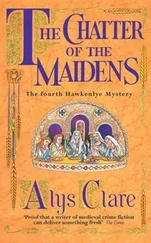Alys Clare - The Paths of the Air
Здесь есть возможность читать онлайн «Alys Clare - The Paths of the Air» весь текст электронной книги совершенно бесплатно (целиком полную версию без сокращений). В некоторых случаях можно слушать аудио, скачать через торрент в формате fb2 и присутствует краткое содержание. Жанр: Исторический детектив, на английском языке. Описание произведения, (предисловие) а так же отзывы посетителей доступны на портале библиотеки ЛибКат.
- Название:The Paths of the Air
- Автор:
- Жанр:
- Год:неизвестен
- ISBN:нет данных
- Рейтинг книги:3 / 5. Голосов: 1
-
Избранное:Добавить в избранное
- Отзывы:
-
Ваша оценка:
- 60
- 1
- 2
- 3
- 4
- 5
The Paths of the Air: краткое содержание, описание и аннотация
Предлагаем к чтению аннотацию, описание, краткое содержание или предисловие (зависит от того, что написал сам автор книги «The Paths of the Air»). Если вы не нашли необходимую информацию о книге — напишите в комментариях, мы постараемся отыскать её.
The Paths of the Air — читать онлайн бесплатно полную книгу (весь текст) целиком
Ниже представлен текст книги, разбитый по страницам. Система сохранения места последней прочитанной страницы, позволяет с удобством читать онлайн бесплатно книгу «The Paths of the Air», без необходимости каждый раз заново искать на чём Вы остановились. Поставьте закладку, и сможете в любой момент перейти на страницу, на которой закончили чтение.
Интервал:
Закладка:
He sensed the Abbess shiver. ‘I will make haste to do what I came to do, my lady,’ he said.
She nodded but did not speak. Sister Euphemia stood close beside her, as if drawing comfort from her presence, and the swift smile which Josse saw the Abbess bestow on the infirmarer as she tucked Sister Euphemia’s arm under her own suggested the comforting might go both ways. He advanced to the bier and, folding back the linen covering the face, stood looking down at the dead man. Who are you? he asked silently. Are you the man who sought refuge at New Winnowlands? Are you the man whom those two Saracen warriors sought? Are the two identities one and the same?
Of all of us here, he thought, only I have seen both men. He had an idea. The sheet draped over the body was generously sized and, careful not to disturb the body any more than he had to, he arranged it in an approximation of the headdress that John Damianos had worn. He worked away silently for a few moments and then stepped back to look.
It was hard to tell; John Damianos’s face had been animated with the movement and the vitality of the living. Josse stared at the deep eye sockets. I really don’t know, he thought. I don’t think this is the same man, but I just cannot be certain.
Sister Euphemia cleared her throat nervously and said, ‘Sir Josse, what are you doing? Can I help you?’
He spun round. He had almost forgotten the two nuns. ‘Sister, I should have explained,’ he said. ‘A stranger was lodging with me at New Winnowlands shortly before this poor soul was found dead on the track. There are similarities between this man and my lodger and I am trying to decide whether they are one and the same.’
‘You know the name of your former guest?’
‘Aye.’
‘And if this were him,’ the infirmarer said eagerly, ‘then we should have a name by which to bury him.’
‘Indeed. But I don’t know-’ He broke off to glance down at the corpse. ‘The man who came to New Winnowlands was clothed in garments that enveloped him closely from throat to feet and he wore a dark headdress that covered all but his eyes, and they were ever in deep shadow.’
Sister Euphemia had gone very still. ‘When did this man arrive on your doorstep, Sir Josse?’
‘Oh — it must be more than a fortnight ago.’ He felt a twitch of excited apprehension. ‘Why do you ask?’
She did not answer immediately. He guessed she realized the import of what she was about to say. Then: ‘Such a man came here about two weeks back. He was clad just as you describe and he was most reluctant to remove even sufficient folds of his clothing for me to treat him. He carried a leather satchel and he kept the strap slung across him even while he was in the safety of my treatment room.’
Josse let out his breath. ‘It sounds exactly like John Damianos,’ he said. ‘He could have been treated here, gone on his way and later, when he could go no further, sought out the first house that he came to asking for lodgings.’ He remembered something. ‘He was exhausted,’ he murmured. ‘I do not think that he could have gone any further; he was on the verge of collapse.’
Sister Euphemia was nodding vigorously. ‘Yes, yes, as was my patient!’ she exclaimed. ‘I could see how weak he was and I offered him a bed for the night. He needed rest and sustenance, for I could tell that both had been in short supply for him of late.’ She sighed. ‘But try as I might, I could not persuade him and he left that same evening.’
‘And then he happened to pass by New Winnowlands,’ Josse said, ‘where he-’
But the Abbess interrupted. ‘I am not sure that he happened to do any such thing, Sir Josse,’ she said. Her face broke into an affectionate smile. ‘Is it not more likely that he sought you out deliberately?’
‘Why in the Lord’s name should he do that?’ Josse demanded. ‘He did not know who I was any more than I knew who he was!’
The Abbess turned to the infirmarer. ‘Sister Euphemia, how did you come to treat this man?’
‘He presented himself with the sick and the ailing late one afternoon,’ she said. ‘He was at the end of the queue and, if my memory serves me right, he was the last patient to be treated.’
‘Last in the queue,’ the Abbess said. ‘Which would have given him ample time to listen to the chatter around him, both among the nursing nuns and also among those seeking their help.’
‘What are you suggesting?’ Josse asked.
The Abbess looked at him. ‘That among the names bandied about, yours probably featured quite prominently,’ she said. ‘You had recently been with us and, dear Sir Josse, you make an impression on people. They remember you and they talk about you.’
He felt himself blushing. ‘Do they?’
‘Yes.’ Her smile widened. ‘In the most favourable of terms, I might add. Do you not agree, Sister?’
‘I do,’ Sister Euphemia said stoutly. ‘A good friend to us you are, Sir Josse, and I for one do not hesitate to say so.’
‘Oh,’ he responded lamely. The awkward sensation of being the subject of the two nuns’ approval was interrupted — much to his relief — by a sudden exclamation from Sister Euphemia.
With a swift ‘May I?’ directed at the Abbess, who, frowning in puzzlement, nodded, the infirmarer stepped up to the bier and gently removed the makeshift linen headdress from the dead man’s face and throat. She stood looking down at him for some time, compassion in her face. Then, turning back to Josse and the Abbess, she said, ‘This is not the man whom I treated.’
‘How can you be sure?’ the Abbess demanded.
‘Because the man I saw had a frightful wound on the underside of his jaw, extending down his neck,’ the infirmarer answered firmly. She laid a tender hand on the dead man’s shoulder. ‘Although this poor soul’s throat has been savagely carved out, I can see from the flesh on either side of the gash that there is no sign of the wound I treated for our mysterious stranger. That wound was extensive and suppurating. I bathed it with lavender oil and then put some of my special ointment on it and I hurt the poor man so much that, for all he never made a sound, he all but fainted when I was done.’
‘What had caused such an injury?’ Josse asked.
‘It looked like a burn. A bad burn, going right down deep into his flesh, as if someone had lit a pitch-soaked brand and held it flaming under his chin.’
‘He was a Saracen,’ Josse said slowly, ‘or, at least, that is what I surmised from his dress, his speech and his mannerisms.’ He met the eyes of the Abbess. ‘I am thinking of how they burn heretics in Europe. Could the man have been a member of a fanatical sect whose preaching antagonized some overzealous French bishop?’
The Abbess shook her head. ‘It is a large conclusion to draw from slight evidence, Sir Josse. And, besides, those who are condemned to the stake do not habitually escape it.’
‘No, I suppose not.’ He sighed deeply.
‘He’d had the burn for some time,’ Sister Euphemia volunteered. ‘Month or more, I’d say. The flesh was quite putrid around the margins of the wound and the pus-’
‘Thank you, Sister,’ the Abbess said softly.
‘Sorry, my lady. Just trying to be helpful.’
Josse watched as the Abbess gave her infirmarer one of those generous, loving smiles that endeared her to her nuns and said, ‘You have, dear Euphemia; oh, you have.’ Turning back to Josse, eyes bright in the soft light, she added, ‘We have achieved our purpose, have we not? We might not know who this poor man is, but we do at least know who he is not.’
‘Aye,’ Josse agreed. And he thought: my instinct was right, then. John Damianos is still alive. Hard on the heels of that thought came another: where is he, then?
Читать дальшеИнтервал:
Закладка:
Похожие книги на «The Paths of the Air»
Представляем Вашему вниманию похожие книги на «The Paths of the Air» списком для выбора. Мы отобрали схожую по названию и смыслу литературу в надежде предоставить читателям больше вариантов отыскать новые, интересные, ещё непрочитанные произведения.
Обсуждение, отзывы о книге «The Paths of the Air» и просто собственные мнения читателей. Оставьте ваши комментарии, напишите, что Вы думаете о произведении, его смысле или главных героях. Укажите что конкретно понравилось, а что нет, и почему Вы так считаете.












